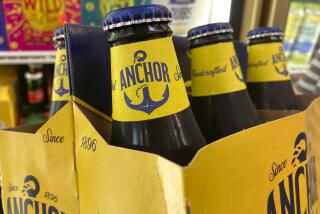Big Changes Brewing : Coors Is Negotiating a $425-Million Deal to Buy Stroh Brewing
- Share via
In a move that will put one of the nation’s oldest brewery families out of the beer business and strengthen the position of another, Adolph Coors Co. said Monday that it will buy most of the brands and bottling plants of Detroit’s Stroh Brewing Co.
The agreement in principle calls for Coors to pay the equivalent of $425 million in cash and assume an unspecified amount of Stroh debt. The deal remains subject to negotiation of a definitive agreement and approval by both companies’ boards and antitrust clearance by the U.S. Department of Justice.
Assuming completion of the deal early next year, Stroh will cease to be a domestic brewer after operating for nearly 150 years. On the other hand, Coors, which traces its roots to an 1872 partnership, would become the nation’s third-largest beer company in terms of sales. St. Louis-based Anheuser-Busch dominated 1988 sales with 41% of the market, followed by Miller Brewing of Milwaukee with a 21.2% share. Stroh ranked third at 10.7%, followed by Coors at 8.6% and G. Heileman at 7.9%.
Van Nuys Plant Not Involved
After integrating the two businesses and shaking out redundant brands, Coors will enjoy a consolidated market share of “about 16%,” predicted Tom Pirko, president of Bevmark, a beverage-marketing consulting firm in Los Angeles that counts Coors among its clients.
Not involved in the agreement were Stroh’s bottling plants in Van Nuys and Memphis, Tenn. Both facilities produce products that will remain with Stroh--California Cooler and White Mountain wine coolers and Sundance Natural Juice Sparklers.
“At this point we have no plans to close those facilities,” said George Kuehn, Stroh senior vice president and general counsel. The deal, however, also provides Coors with an option to buy the plants if they are put up for sale, he said.
Paul Gillette, publisher of the Beverage Hotline newsletter in Los Angeles, doubted that Stroh would retain the Van Nuys and Memphis plants for long. Closing them, he said, “would be in line with a trend occurring in the liquor industry as well as in beer: As there are consolidations, they go to capacity (production) at their most efficient plants” and close the others.
“There’s just too much capacity,” Pirko agreed. “It’s a tough, tough time to be in the beer business.”
On the other hand, Coors will acquire Stroh breweries in St. Paul, Minn., Tampa, Fla., Winston-Salem, N.C., Longview, Tex., and Allentown, Pa., as well as container-making plants in Winston-Salem and Longview.
‘Got to Be Significant’
At a Colorado press conference, Coors Chairman Peter Coors said it is “premature to talk strategy” in terms of which brands will be retained or where they will be brewed. Some “do not overlap significantly,” he noted, but others compete directly. For example, Stroh’s best-selling Old Milwaukee brand competes directly in the low end of the market with Coors’ recently introduced Keystone.
“If we are going to be in the beer business long term,” Coors told reporters, “we’ve got to be a major and significant competitor.”
Both Coors and Stroh were regional brands for much of their long histories. Coors now is sold in every state but Indiana, because of its distribution laws. Stroh dates from 1850, when Bernhard Stroh, who had emigrated from Germany during social upheaval two years before, opened a brewery in Detroit. It has been owned and operated by the family ever since, and its stock now is held by 27 family members.
Under Chairman and Chief Executive Peter W. Stroh, the company in the 1970s expanded its product line and, in 1982, vaulted into a national presence and No. 3 position in sales by acquiring Schlitz, which included the Van Nuys plant.
“Deep in my heart I know it’s either grow or go,” he said at the time, which happened to coincide with the start of a persistent downturn in national beer consumption. To lighten its debt in the face of falling sales, Stroh has been looking for potential partners since February. On Aug. 31, it said it would cut 300 of its 1,500 office help nationwide.
In a statement issued by Coors, Peter Stroh said the decision to sell the brewing business was “difficult” but called Coors “the most appropriate brewer to continue the legacy of Stroh’s. Coors, which is still run by the founding family, shares my conviction that when your name is on the bottle, the product inside must be of the highest quality.”
The two family enterprises “were more than just competitors,” said Coors spokesman George Valuck. “Coors was the Stroh of the West, and Stroh the Coors of the East,” he said.
Private Company
Acquired brands include Stroh’s, Stroh’s Light and Stroh’s Signature; Schlitz, Schlitz Light and Schlitz Malt Liquor; Schaefer, Schaefer Light, Schaefer no-alcohol and low-alcohol brands; Old Milwaukee and Old Milwaukee Light; Goebel; Red Bull; Silver Thunder, and St. Barts (a no-alcohol beer). Coors also would assume licensing rights to Piels, Piels Light and Augsburger beers, but not to California Cooler, which Stroh licenses from Brown-Forman of Louisville, Ky.
According to Beer Marketer’s Insights, an industry publication published in New York, Stroh sales totaled about $1.3 billion last year, about the same as Coors. Stroh, a private company, does not report financial data. While the Coors family owns all the voting stock of Adolph Coors Co., Coors’ nonvoting stock is sold over the counter, where shares closed at $23.75, up $1.50.
More to Read
Inside the business of entertainment
The Wide Shot brings you news, analysis and insights on everything from streaming wars to production — and what it all means for the future.
You may occasionally receive promotional content from the Los Angeles Times.









